The Grapevine Art & Soul Salon
HOMELESS GURUS: An Appreciation by Barbara Knott with Jonathan Knott
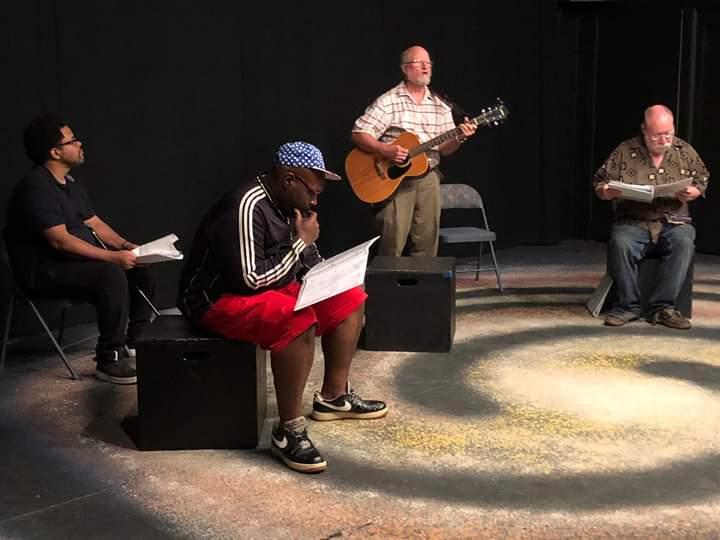
On Sunday, August 25, Jonathan and I spent the afternoon at one of our favorite venues, the Mask Center located in the Little Five Points Center for Arts and Culture, absorbed in two hours of poetry, storytelling and song created by four men "who are or have been homeless in Atlanta." The project was conceived by Beverly Means from Homes of Light: Restoring Hope Through Housing, and cultivated for the stage by Sandra Hughes, Producing Artistic Director of Gateway Performance Productions. During three months of creative writing and acting workshops, performers Reggie Prim, Robert Howell, Quan Scott, and Stephen Leininger spent 60 hours working with Sandra Hughes on original material and preparing it for presentation. Sandra says she was "constantly inspired by the wisdom and insights contained in their conversations and writing." The result: men apparently without means were about to display a wealth of inner resources far more meaningful than material wealth.
About 30 people gathered with us in front of a stage set sparsely with chairs and a couple of cubes that would be manipulated as the performers, interweaving, took turns claiming our attention. We gave it with growing delight as we discovered the talent unfolding vigorously in front of us through four men of different ages, two black and two white, with a guitar, a cane, and some Tarot cards. The testimonies presented in a variety of ways ... speaking, singing, rapping, reciting monologues (all original material) ... let us know what it feels like to be lost, alone, dehumanized, abused, hopeless, and to find resilience through creativity.
A brief introduction to the players: Quan Scott, in Sandra's words, is "the enlightened rapper who performed his inspirational poetry and song." Robert Howell, who can be seen below exploring Tarot cards with Quan Scott, reported to her that he went to college at age 15, graduating from Mercer with a degree in religion and philosophy as well as minors in drama and sociology. Over the years, he said, he has worked in many places and reads Tarot cards for pay. He has a television pilot on You Tube under Primrose Tales called "Driving Baron Samedi."
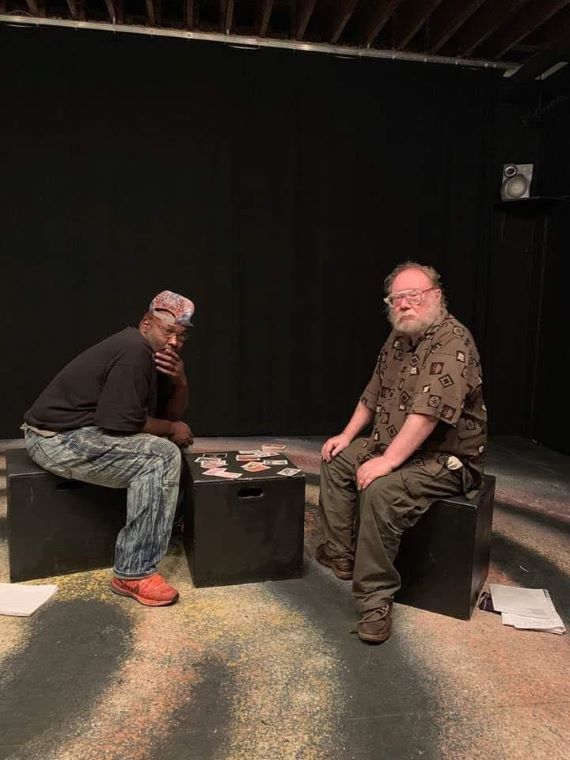
Reggie Prim presented a monologue from his own play "Buddy Bolden's Funky Butt Blues," about the father of jazz from New Orleans, in this evening's performance. Sandra reports that earlier this year, Reggie's play was read at The Mask Center where she, as director, is currently helping him continue its development. Steven Leininger, the poet/songwriter with the guitar, told the story of how he came to Atlanta to serve as a live-in volunteer for an organization that supplied services to the homeless and within a short time found himself homeless when he was asked to leave with no explanation. He reckoned it might have been because he was instructed to shun another volunteer and refused to do so, declaring on stage here that he didn't want to shun anyone.
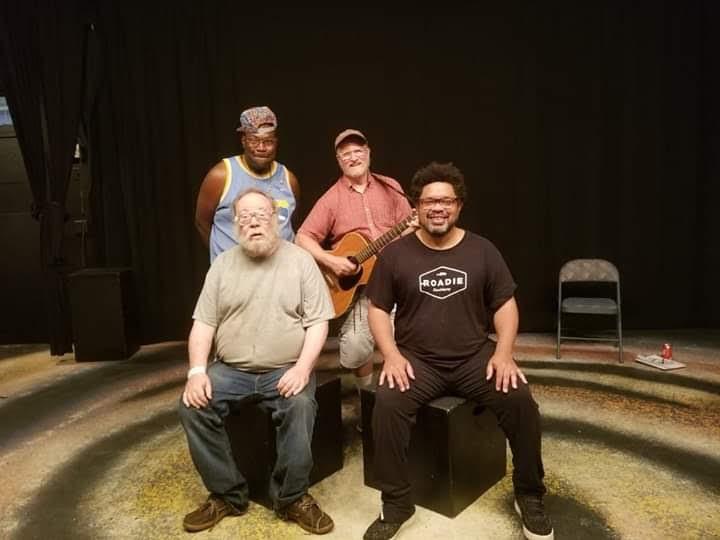
Ultimately, the audience was brought directly into the scene to answer the question: When have I felt or been homeless? This question added a new dimension to our theater experience. My own training in drama therapy had already helped me recognize the potential here for discovering creativity, meaning and purpose through enacting personal stories. I appreciated the question that spoke directly to the audience, compelling us to think about our link to the men on stage. I was thinking, too, about how right it was to call them "gurus," given the Sanskrit word's association in Hinduism and Buddhism with spiritual guides who often followed a path of voluntary homelessness. As spiritual guides, gurus are also teachers. Sandra said that as she worked with these men, she realized how much she was learning from them and how much they learned from each other. Eventually, after hearing responses showing how much the audience learned from them, she realized that by all working together, "We were able with this project to fulfill Gateway's mission: To create original art that is mesmerizing and transformative in its power to connect participants to the essential truths of their humanity."
This afternoon at the theater took me back to one of my favorite books, David Whyte's collection of poetry called The House of Belonging in which he urges us to reconsider our labeling the present as "the age of information":
Forget the news,
and the radio,
and the blurred screen.
This is the time
of loaves
and fishes.
People are hungry,
and one good word is bread
for a thousand.
(p. 88)
I had come into the theater with a feeling of not being at home in the world outside, full of technologically imprisoned young people and dreary politics suffocating their elders. Here, we were introduced to four real people, young and elder, whose presence was palpable and full of talent and integrity, people who gave us through good words our metaphorical loaves and fishes.
Leaving, Jonathan recalled Reggie Prim saying that as a homeless person he'd sometimes slept on the ground under the air conditioner of the building where he was now performing. Jonathan also said some other things about the question and answer session that followed the performance. Here is what he wrote about that for the article.
One of the benefits of theater in a smaller venue is that it often allows for a question and answer session with the audience after a performance. This typically occurs only after an open dress rehearsal or on the final night of a run, and while often pleasant enough, there usually remains a bit of a distance between cast and audience, with both questions and answers being neither particularly informative nor revealing of either side. In this case the Q&A session with the audience was wholly unlike that. Whether it was the small crowd and intimate setting, with the actors speaking as themselves about an uncomfortable and polarizing subject, or whether much of the crowd was there specifically because of their own experience with homelessness or at least their own curiosity/fascination, or whether perhaps it was a combination of these factors, the post performance session was nearly as emotionally intense as the performance itself.
There were some who related their own experiences of homelessness (one of which earned an emotional hug from one of the performers). Some claimed they always do what they can when they see someone in need, and others, sounding a bit ashamed, admitted that they often deliberately look away from the homeless at red lights or perhaps worse, gaze upon them with pity or revulsion. There were those who pointed out, "There but for the grace of god go I or any of us," and asked what they could do to be more helpful. The performers essentially replied that one of the worst aspects of homelessness is losing one's individuality in the eyes of others and becoming instead part of a collective, lesser, nameless form of humanity viewed through a different lens than "regular" people are viewed. They implied that what was most important to them was to have that barrier lifted and for everyone to see each other as human beings, which nobody, having watched the performance, could well deny. The discussion felt almost like group therapy, as if we had laid ourselves bare, shared catharsis, built each other back up, hugged it out, and had gone on our way with a fresh perspective, both humbled and wiser for the experience.
My main takeaway from the event, as we parted with many expressions of appreciation in gesture and words was this: These homeless men had made a home in their own hearts and now had built a neighborhood in the hearts of the audience.
To Beverly Means and Sandra Hughes and their supporters, and to the gurus they are celebrating, we offer these lines from David Whyte as a blessing on their work:
Let my history then
be a gate unfastened
to a new life
and not a barrier
to my becoming.
(p. 46)
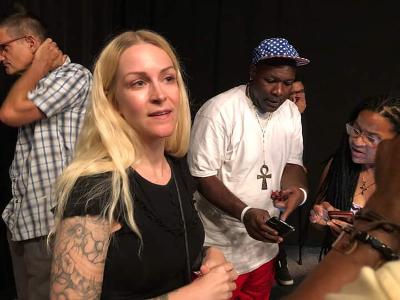
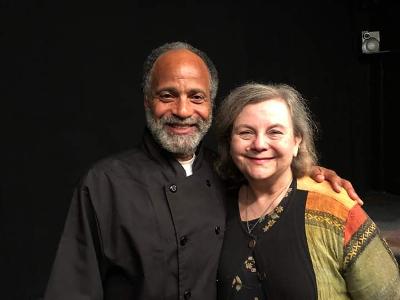
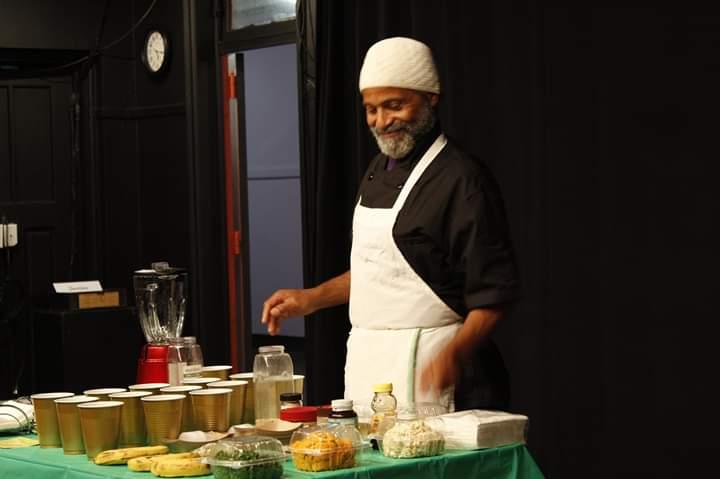
For a brief video look at this night's performance, go to
More information and photos can be seen on Facebook pages for each of the men, under the names given here.
Acknowledgements:
Production of HOMELESS GURUS was made possible in part by support to Gateway Performance Productions from the Georgia Council for the Arts, the Fulton County Commissioners under the Guidance of Fulton County Arts and Culture, and individual contributors.
Gateway Performance Productions, which is, among other things, "dedicated to utilizing the power of the Arts to transform and heal lives," accepted the proposal from Beverly Means of producing from her project the piece that Sandra Hughes ultimately called "Homeless Gurus." Sandra created the design, adapted the original material provided by the participants and directed the performance. She says she sensed that their combined creative efforts would "engender a powerful revelatory experience for audiences ... a positive learning platform offering opportunities for individual and community transformation and healing." The Mask Center, established in 2000, located at The Little Five Points Center for Arts and Culture (formerly the Little Five Points Community Center), 1083 Austin Avenue, NE, Atlanta, Georgia (Ground Floor, Room 008), is a Gateway project. According to Sandra Hughes, the theater "not only serves as a rehearsal, performance, exhibit and workshop space for Gateway, it provides affordable rehearsal, performance and workshop space for hundreds of other artists annually in the fields of dance, theater, music, film, visual and literary arts." She adds, "We do this because for many years we had no venue of our own and we want to make it possible for other artists to have access to creative space."
Quotations from David Whyte, The House of Belonging. Langley, Washington: Many Rivers Press, 2016.
Related sites:
Homes of Light, whose mission is "To end homelessness": www.homesoflightllc.org
Gateway Performance Productions, a nonprofit arts and education organization whose mission (mentioned above) is "To create original art that is mesmerizing and transformative in its power to connect participants to the essential truths of their humanity": www.gatewayperformanceproductions.org
Sandra Hughes: www.sandrahughes.net
For further reading of work related to The Mask Theater and Gateway Performance Productions, see article full of gorgeous photos at Issue 21, The Grapevine Art and Soul Salon